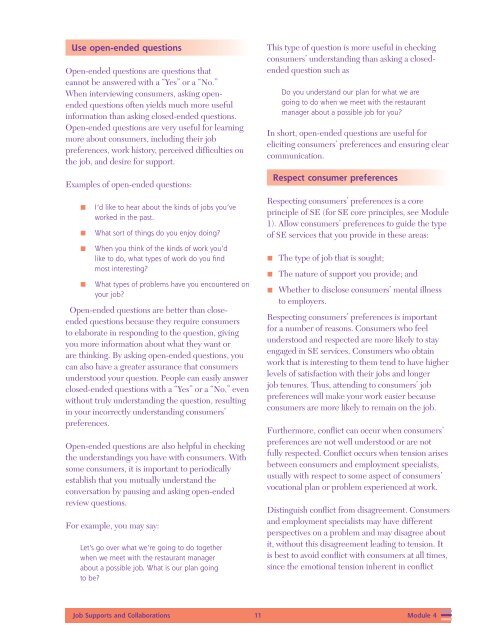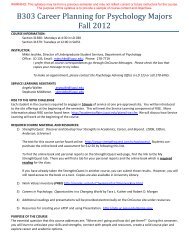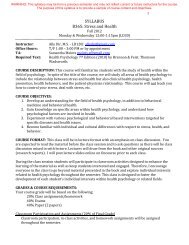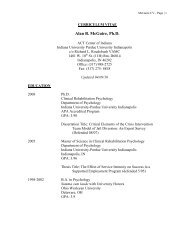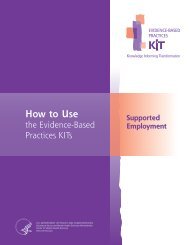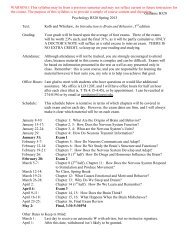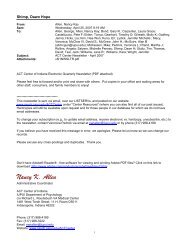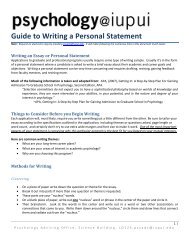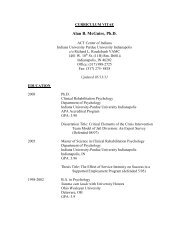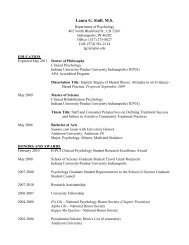Supported Employment: Training Frontline Staff - SAMHSA Store ...
Supported Employment: Training Frontline Staff - SAMHSA Store ...
Supported Employment: Training Frontline Staff - SAMHSA Store ...
You also want an ePaper? Increase the reach of your titles
YUMPU automatically turns print PDFs into web optimized ePapers that Google loves.
Use open-ended questions<br />
Open-ended questions are questions that<br />
cannot be answered with a “Yes” or a “No.”<br />
When interviewing consumers, asking openended<br />
questions often yields much more useful<br />
information than asking closed-ended questions.<br />
Open-ended questions are very useful for learning<br />
more about consumers, including their job<br />
preferences, work history, perceived difficulties on<br />
the job, and desire for support.<br />
Examples of open-ended questions:<br />
• I’d like to hear about the kinds of jobs you’ve<br />
worked in the past.<br />
• What sort of things do you enjoy doing<br />
• When you think of the kinds of work you’d<br />
like to do, what types of work do you find<br />
most interesting<br />
• What types of problems have you encountered on<br />
your job<br />
Open-ended questions are better than closeended<br />
questions because they require consumers<br />
to elaborate in responding to the question, giving<br />
you more information about what they want or<br />
are thinking. By asking open-ended questions, you<br />
can also have a greater assurance that consumers<br />
understood your question. People can easily answer<br />
closed-ended questions with a “Yes” or a “No,” even<br />
without truly understanding the question, resulting<br />
in your incorrectly understanding consumers’<br />
preferences.<br />
Open-ended questions are also helpful in checking<br />
the understandings you have with consumers. With<br />
some consumers, it is important to periodically<br />
establish that you mutually understand the<br />
conversation by pausing and asking open-ended<br />
review questions.<br />
For example, you may say:<br />
Let’s go over what we’re going to do together<br />
when we meet with the restaurant manager<br />
about a possible job. What is our plan going<br />
to be<br />
This type of question is more useful in checking<br />
consumers’ understanding than asking a closedended<br />
question such as<br />
Do you understand our plan for what we are<br />
going to do when we meet with the restaurant<br />
manager about a possible job for you<br />
In short, open-ended questions are useful for<br />
eliciting consumers’ preferences and ensuring clear<br />
communication.<br />
Respect consumer preferences<br />
Respecting consumers’ preferences is a core<br />
principle of SE (for SE core principles, see Module<br />
1). Allow consumers’ preferences to guide the type<br />
of SE services that you provide in these areas:<br />
• The type of job that is sought;<br />
• The nature of support you provide; and<br />
• Whether to disclose consumers’ mental illness<br />
to employers.<br />
Respecting consumers’ preferences is important<br />
for a number of reasons. Consumers who feel<br />
understood and respected are more likely to stay<br />
engaged in SE services. Consumers who obtain<br />
work that is interesting to them tend to have higher<br />
levels of satisfaction with their jobs and longer<br />
job tenures. Thus, attending to consumers’ job<br />
preferences will make your work easier because<br />
consumers are more likely to remain on the job.<br />
Furthermore, conflict can occur when consumers’<br />
preferences are not well understood or are not<br />
fully respected. Conflict occurs when tension arises<br />
between consumers and employment specialists,<br />
usually with respect to some aspect of consumers’<br />
vocational plan or problem experienced at work.<br />
Distinguish conflict from disagreement. Consumers<br />
and employment specialists may have different<br />
perspectives on a problem and may disagree about<br />
it, without this disagreement leading to tension. It<br />
is best to avoid conflict with consumers at all times,<br />
since the emotional tension inherent in conflict<br />
<strong>Training</strong> Job Supports <strong>Frontline</strong> and Collaborations <strong>Staff</strong> 11 Module 4


